Situated near the picturesque city of Udaipur, Jaisamand Wildlife Sanctuary is a haven for nature enthusiasts and wildlife lovers. Spanning over 875 square kilometres, this sanctuary is one of the largest in Rajasthan and offers a diverse range of flora and fauna. This wildlife sanctuary is a seasonal location that only opens for a certain period of time every year. Established in 1957, it is known for its rich biodiversity, including species such as leopards, deer, and a variety of bird species.
Jaisamand Wildlife Sanctuary Location
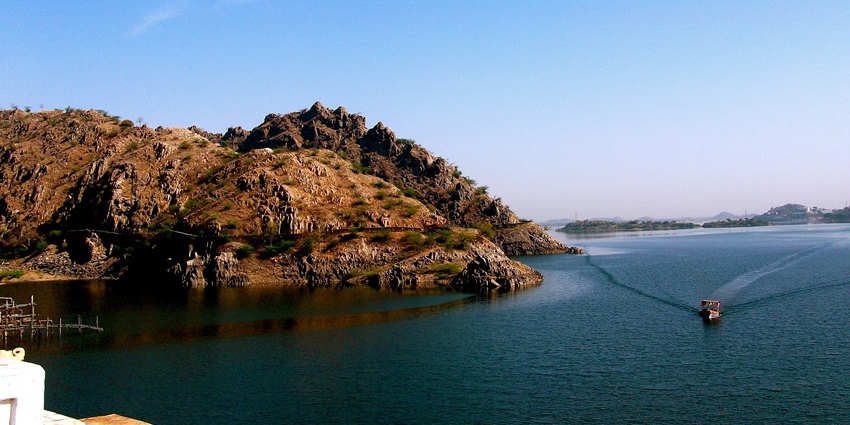
Photo: Alazhars / Wikimedia Commons
Jaisamand Wildlife Sanctuary is located in Udaipur district, Rajasthan, India. It surrounds the Jaisamand Lake, one of the largest artificial lakes in Asia, created by Maharana Jai Singh in the 17th century. The sanctuary’s location near the lake enhances its scenic beauty and provides a habitat for a wide variety of wildlife species. The area’s undulating terrain, combined with the lake, offers a unique environment for both flora and fauna.
Suggested Read: Wildlife Sanctuaries In Udaipur
How To Reach Jaisamand Wildlife Sanctuary
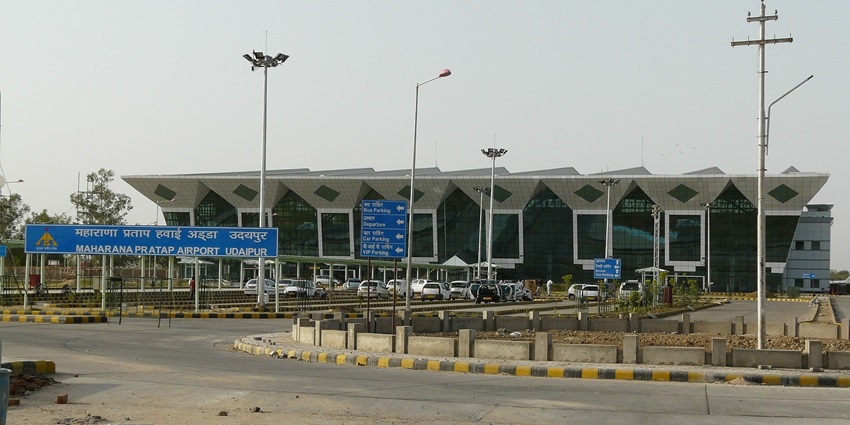
Photo: Northside / Wikimedia Commons
By Air: The nearest airport to Jaisamand Wildlife Sanctuary is Maharana Pratap Airport in Udaipur, approximately 45 kilometres away. From the airport, you can hire a taxi or use local transport to reach the sanctuary.
By Bus: Udaipur is well connected by road, with regular bus services from major cities in Rajasthan. Once you arrive in Udaipur, you can take a taxi or local bus to reach the sanctuary.
By Rail: Udaipur Railway Station is the closest railhead, located about 35 kilometres from the sanctuary. From the station, you can hire a cab or take a local bus to reach Jaisamand Wildlife Sanctuary.
Places To Visit In And Around Jaisamand Wildlife Sanctuary
Discover the natural beauty of Jaisamand Wildlife Sanctuary and explore nearby attractions, from serene lakes to ancient temples:
1. Jaisamand Lake
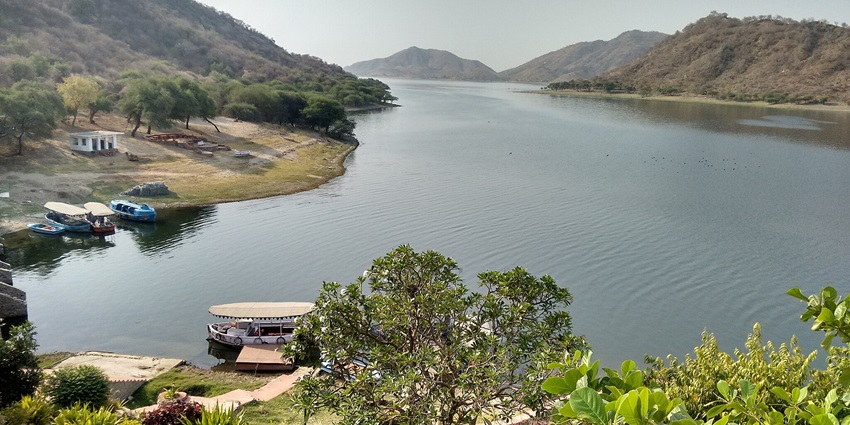
Photo: Dr. Rushikesh joshi / Wikimedia Commons
Jaisamand Lake, also known as the Dharmraj Mahal Lake, is one of the largest artificial lakes in Asia. The lake is a major attraction within the sanctuary, offering breathtaking views and opportunities for boating. The serene waters of the lake, surrounded by hills and lush greenery, create a picturesque setting for visitors. The lake is also home to a variety of bird species, making it a great spot for birdwatching.
Distance From The Sanctuary: 30 km
Suggested Read: Famous Lakes In Rajasthan
2. The Jaisamand Palace
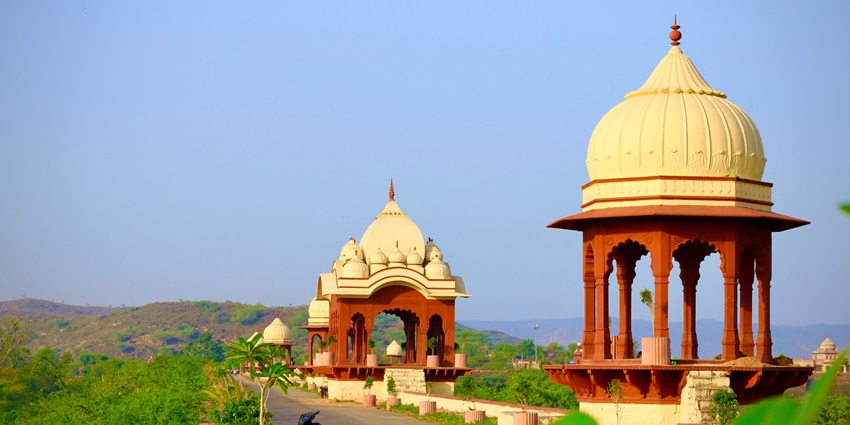
Jaisamand Palace, constructed by Maharaja Jai Singh, is a historic marvel overlooking the serene Jaisamand Lake. Showcasing traditional Rajasthani architecture, the palace is adorned with intricate carvings and features expansive courtyards. Visitors can wander through the grand halls and enjoy breathtaking views of the lake and surrounding landscapes. This palace not only highlights the region’s architectural brilliance but also offers a glimpse into the rich royal heritage of Udaipur.
Distance From The Sanctuary: 30 km
3. The Marble Chhatri
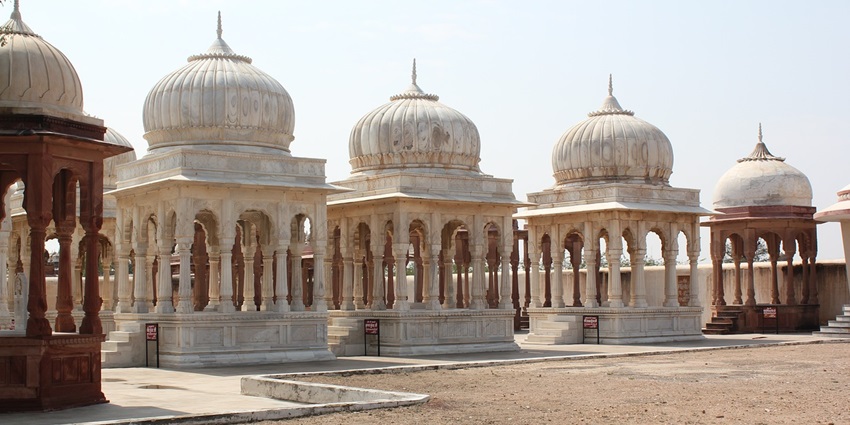
Photo: PDL / Pixabay / Image For Representation Only
The Marble Chhatri, situated near the tranquil Jaisamand Lake, is a captivating monument renowned for its intricate marble carvings and exquisite architecture. Built as a cenotaph in memory of Maharana Jai Singh’s queen, the chhatri displays elegant designs and detailed craftsmanship, reflecting the rich artistic heritage of the region. Set against the serene backdrop of the lake and lush forests, this peaceful spot offers a quiet retreat for reflection.
Distance From The Sanctuary: 31 km
Suggested Read: Popular Places To Visit Near Udaipur
4. Sukhadia Circle
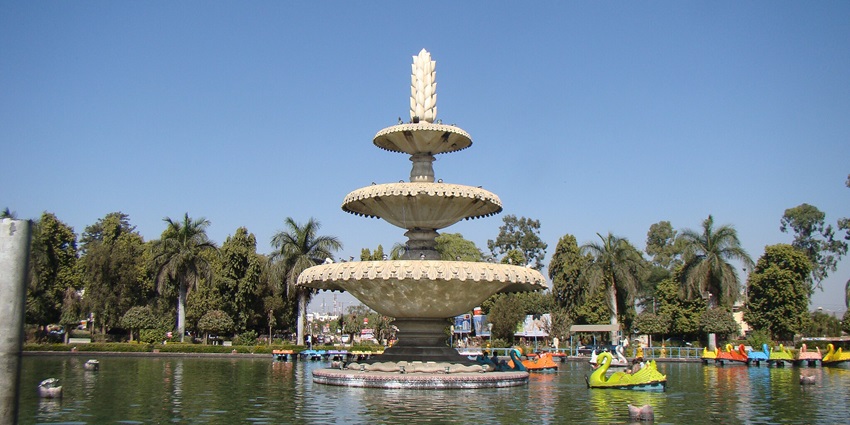
Photo: Arastu Gupta / Wikimedia Commons
Sukhadia Circle is a well-known landmark in Udaipur, admired for its beautifully maintained gardens and striking fountains. While not located within the Jaisamand Wildlife Sanctuary, it is a popular attraction for visitors exploring Udaipur. The circle is centred around a large fountain, surrounded by lush greenery, creating a pleasant setting for leisurely walks or picnics. With its tranquil atmosphere, Sukhadia Circle provides the perfect spot to relax and unwind.
Distance From The Sanctuary: 46 km
5. Lake Pichola
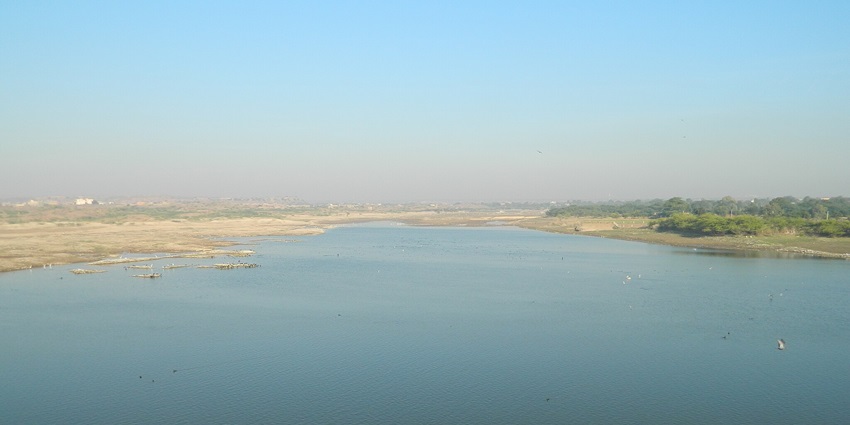
Photo: Abhishek raj kalla / Wikimedia Commons
Lake Pichola, situated close to the Jaisamand Wildlife Sanctuary, is a serene haven for nature enthusiasts, offering peaceful surroundings for boating and fishing. Enveloped by lush greenery, the lake provides a tranquil setting ideal for relaxation and observing local wildlife. Its calm waters and picturesque scenery make it an excellent spot for those seeking a quiet retreat in nature.
Distance From The Sanctuary: 43 km
Suggested Read: Best Lakes In Udaipur For Scenic Beauty And Tranquility
6. Roothi Rani ka Mahal (Hawa Mahal)
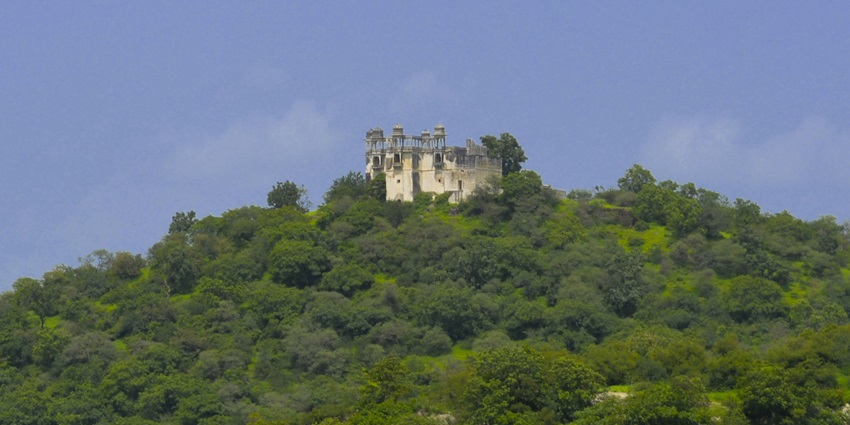
Photo: Ankit Choudahry / Wikimedia Commons
Roothi Rani ka Mahal is an old castle that sits on the shore of Jaisamand Lake. The building was made by Maharana Jai Singh in the 1600s, and its name comes from the story of a queen who left court life to live a quiet life. The palace is surrounded by beautiful nature and looks out over calm water. It is often mentioned among the top places to visit in Udaipur, as it remains a peaceful and beautiful spot for people who like history and grand architecture.
Distance From The Sanctuary: 10 km
7. Jaisamand Island Resort
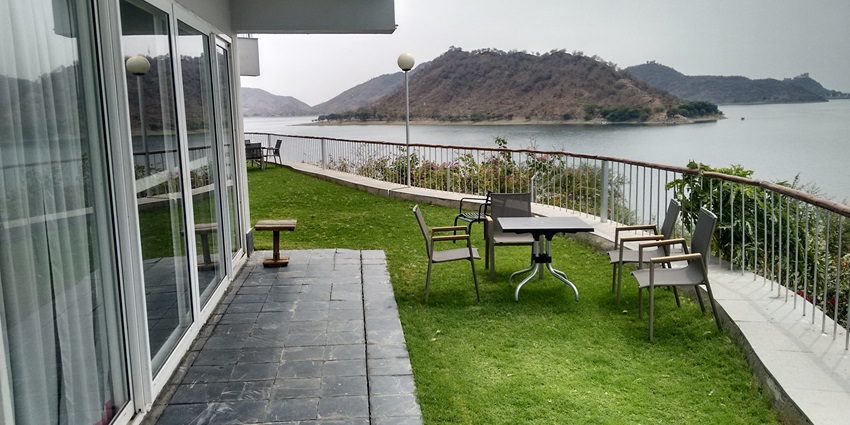
Photo: Dr. Rushikesh joshi / Wikimedia Commons
The Jaisamand Island Resort is on an island in Jaisamand Lake, which is India’s second-largest man-made lake. Being surrounded by calm water and lots of greenery, the resort is both luxurious and peaceful, making it a great place to relax. Guests can take boat rides, go on nature walks, and watch the beautiful sunsets over the lake. With its modern amenities and architecture that is based on Indian heritage, the resort offers a unique experience that blends comfort with the natural beauty of Rajasthan.
Distance From The Sanctuary: 31 km
Suggested Read: Offbeat Places In Udaipur
8. Kesariyaji Jain Temple
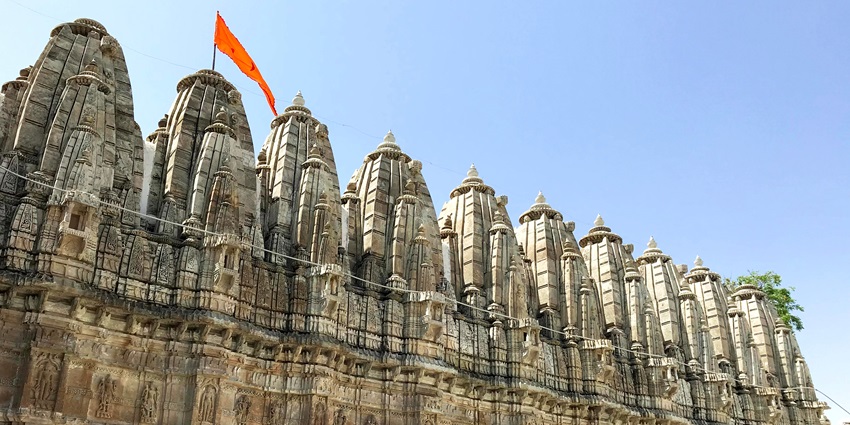
Photo: Hardik Dedhia / Shutterstock
The Kesariyaji Jain Temple, which is near Udaipur, is a holy place where people go to honour Lord Rishabhdev, who was the first Tirthankara of Jainism. Built in the 1400s, the temple is famous for its detailed marble carvings and fine work that show off Mewar’s artistic history. People from all over India come to worship at the temple because it has such a deep spiritual meaning.
Distance From The Sanctuary: 47 km
Where To Stay
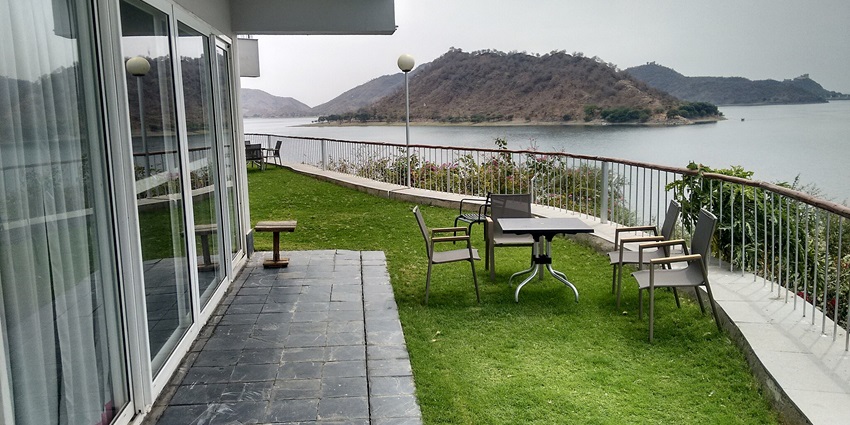
Photo: Dr. Rushikesh joshi / Wikimedia Commons
Accommodation options near Jaisamand Wildlife Sanctuary range from luxury resorts to budget hotels. Popular choices include the Taj Lake Palace, offering luxurious amenities and stunning views of the lake, and the Udaipur Leela Palace, known for its elegant design and top-notch services. For budget-conscious travellers, there are several guesthouses and hotels in Udaipur city that provide comfortable stays at affordable rates. Additionally, eco-friendly lodges and resorts near the sanctuary offer a more immersive nature experience.
Suggested Read: Things To Do In Udaipur In 2 Days
Where To Eat

Photo: Simranjeet Sidhu / Wikimedia Commons
Dining options near Jaisamand Wildlife Sanctuary include a variety of local and international cuisines. Many hotels and resorts offer in-house dining with a range of dishes, from traditional Rajasthani fare to continental cuisine. Popular restaurants in Udaipur include the Ambrai Restaurant, known for its lakeside dining and diverse menu, and the Natraj Dining Hall, offering authentic Rajasthani thalis. Local eateries and street food vendors in Udaipur provide an opportunity to sample regional delicacies and snacks.
Best Time To Visit Jaisamand Wildlife Sanctuary
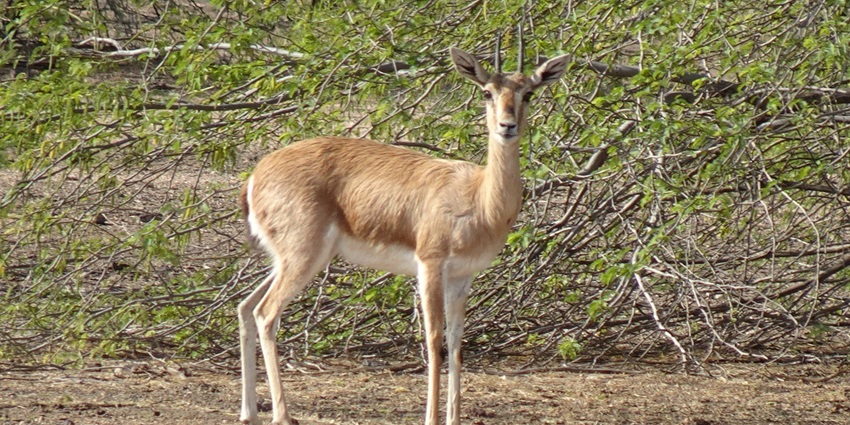
Photo: sarangib / Pixabay / Image For Representation Only
The Jaisamand Wildlife Sanctuary is open from October to March. During these months, the weather is pleasant and ideal for outdoor activities and wildlife viewing. The temperatures are moderate, and the chances of rain are minimal, providing a comfortable experience for visitors. Jaisamand Wildlife Sanctuary timings are from 9 AM to 5 PM, Monday to Sunday.
Suggested Read: Rajasthan Weekend Trip
Other Factors To Consider
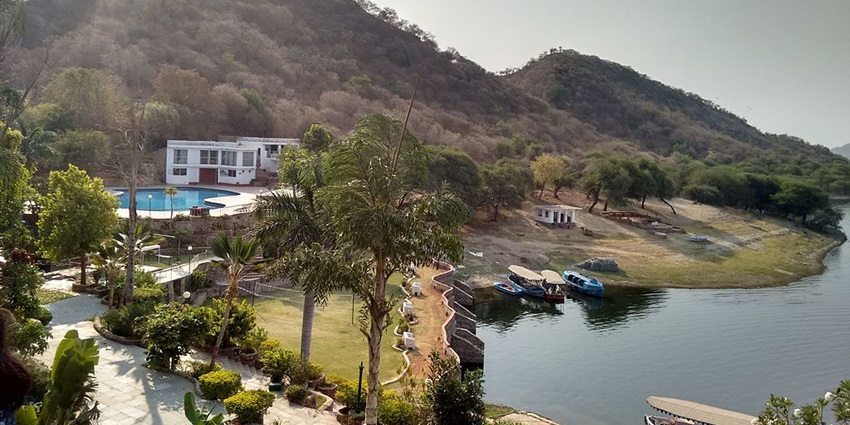
Photo: Dr. Rushikesh joshi / Wikimedia Commons
Average Cost Of The Trip
It can range from ₹12,000 to ₹25,000 per person, depending on your choice of accommodation, dining, and activities. Luxury stays and guided tours can increase the overall cost, while budget-friendly options and self-guided tours can help manage expenses. Be sure to factor in travel costs, Jaisamand Wildlife Sanctuary ticket price, and any additional activities you plan to undertake.
Tips For Travellers:
- Reserve your accommodation and safari slots well ahead of time, especially during peak tourist seasons, to secure the best options and rates.
- Bring comfortable clothing, a hat, sunscreen, and a good pair of binoculars for wildlife spotting. Also, carry a camera to capture the sanctuary’s natural beauty and create memorable Jaisamand Wildlife Sanctuary Photos.
- Follow all guidelines and regulations provided by the sanctuary authorities to ensure a safe and respectful visit for both you and the wildlife.
- Carry enough water and stay hydrated, especially during outdoor activities and while exploring the sanctuary.
Jaisamand Wildlife Sanctuary, Udaipur, offers a fresh blend of natural beauty and rich wildlife, making it an ideal destination for nature lovers and adventure seekers. From serene lakes to historic monuments, the sanctuary provides a peaceful retreat amidst Rajasthan’s stunning landscapes. Plan your visit with ease and explore the sanctuary’s wonders by booking your trip through TripXL for a hassle-free and memorable experience.
Cover Photo: Ankto420 / Wikimedia Commons


 WhatsApp
WhatsApp
 Twitter
Twitter









